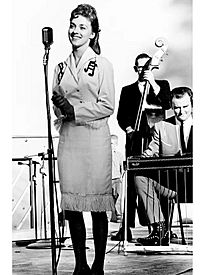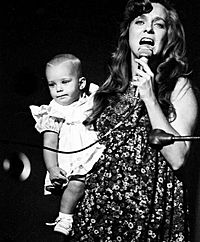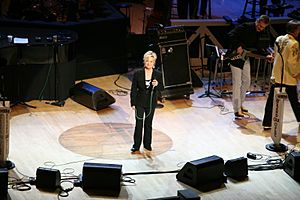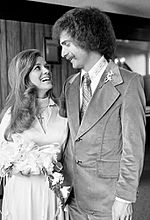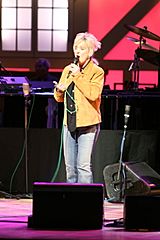Connie Smith facts for kids
Quick facts for kids
Connie Smith
|
|
|---|---|
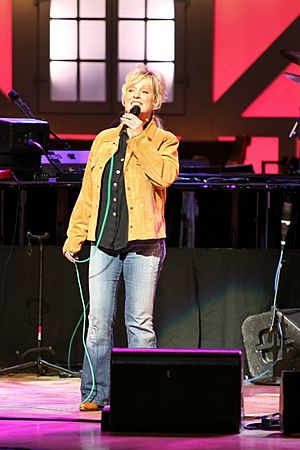
Smith performing live at the Grand Ole Opry in 2007
|
|
| Born |
Constance June Meador
August 14, 1941 Elkhart, Indiana, U.S.
|
| Occupation |
|
| Years active | 1964–present |
| Known for | "Once a Day" |
| Spouse(s) |
|
| Children | 5 |
| Musical career | |
| Genres | |
| Instruments |
|
| Labels |
|
| Associated acts |
|
Connie Smith (born Constance June Meador on August 14, 1941) is an American country music singer and songwriter. Her powerful singing voice has been called very important and inspiring for other women in country music. Many people have said her singing style is similar to another famous country singer, Patsy Cline. Other artists have also mentioned Connie Smith as a big influence on their own music.
Connie Smith was discovered in 1963 and signed with RCA Victor Records in 1964. She stayed with them until 1973. Her very first song, "Once a Day", was nominated for a Grammy Award. It became a number one hit on the Billboard country music chart in November 1964 and stayed there for eight weeks. This was a record for any female country artist at the time! While Taylor Swift later broke this record in 2012, Connie Smith held it for 48 years. Throughout the 1960s and mid-1970s, she had 19 more songs reach the top 10 on the country charts. Some of these hits include "Then and Only Then", "Ain't Had No Lovin'", "Cincinnati, Ohio", and "Ain't Love a Good Thing".
In the early 1970s, Connie Smith started recording more gospel music because her Christian faith became very important to her. She also spent more time raising her five children. She mostly stopped performing in 1979 but returned to music in the mid-1980s. She made a full comeback in the 1990s after working with country artist Marty Stuart. They became good friends, then fell in love and got married in 1997. Her album Connie Smith was her first new studio album in 20 years and was highly praised. Since then, she has continued to perform and record new music.
Connie Smith has been nominated for 11 Grammy Awards. She has also been nominated for awards from the Academy of Country Music and the Country Music Association. Rolling Stone magazine included her on their list of the 100 greatest country music artists. CMT also ranked her among the top 10 greatest women in country music. She has been a member of the famous Grand Ole Opry since 1965. In 2012, Connie Smith was honored by being added to the Country Music Hall of Fame.
Contents
Early Life and Discoveries
Constance June Meador was born in Elkhart, Indiana. When she was five months old, her family moved to West Virginia, and later to Ohio. She had a challenging childhood. Her mother later remarried, and Connie grew up in a large family with 15 children.
Music was a big part of her childhood. Her stepfather played the mandolin, and her brothers played the fiddle and guitar. On Saturday nights, her family would listen to the Grand Ole Opry radio show. Connie started playing the guitar after an accident that hurt her leg. While she was recovering, she was given a guitar and learned to play chords. She didn't sing in public until high school when a friend asked her to sing "My Happiness".
After graduating from high school in 1959, Connie worked different jobs, including as a telephone operator and a dental assistant. At 19, she married Jerry Smith, who encouraged her singing. She started performing more often, including at the 1962 Washington County Fair. She even appeared on a local country music TV show.
Even with these opportunities, Connie planned to be a homemaker. But in August 1963, she entered a talent contest. She sang Jean Shepard's "I Thought of You" and won! Bill Anderson, a country singer and songwriter, was a judge and was very impressed by her voice. He later said he thought she was lip-syncing to a record.
In January 1964, Connie met Bill Anderson again. He invited her to sing on Ernest Tubb's Midnite Jamboree radio show in Nashville, Tennessee. She performed on the show in March 1964. After her performance, Loretta Lynn introduced herself and gave Connie some career advice. In May 1964, Connie returned to Nashville to record demo songs for Bill Anderson. Anderson's manager, Hubert Long, took the demo to RCA Victor Records. The producer, Chet Atkins, heard it and was also very impressed. He offered Connie a recording contract, which she signed on June 24, 1964.
Music Career
Early Success with "Once a Day"
After Connie Smith signed with RCA, Chet Atkins was too busy, so he asked Bob Ferguson to be her producer. They worked very well together, and Ferguson remained her producer for many years. Connie's first recording session was on July 16, 1964, where she recorded four songs, three of which were written by Bill Anderson. Two days later, she made her debut at the Grand Ole Opry.
One of the songs recorded was "Once a Day". It was released in August 1964 and quickly became a hit. On November 28, it reached number one on the Billboard Magazine country chart. It stayed at the top for eight weeks, from late 1964 to early 1965. "Once a Day" was the first debut song by a female country artist to reach number one. For almost 50 years, it held the record for the most weeks at number one by a female artist on the Billboard country chart.
With the success of "Once a Day", Connie Smith started performing more often. She appeared on ABC's The Jimmy Dean Show in October 1964. In March 1965, RCA Victor released her first album, Connie Smith. It also reached number one on the Billboard country albums chart and stayed there for seven weeks.
Bill Anderson continued to write songs for Connie. In 1965, RCA released her next song, "Then and Only Then", which reached number four on the country charts. Another song written by Anderson, "I Can't Remember", also made the top 10. This song was on her second album, Cute 'n' Country, which also topped the Billboard country albums chart. She had more top five hits in early 1966, including "Nobody But a Fool (Would Love You)" and "If I Talk to Him". In 1965, Connie Smith officially became a member of the Grand Ole Opry.
In 1966, RCA wanted Connie's music to sound more like pop music. Connie didn't like this idea, but she tried it. Her albums Born to Sing (1966) and Downtown Country (1967) featured full orchestras. These albums included the hit songs "Ain't Had No Lovin'" and "The Hurtin's All Over", both reaching the country top five. During this time, Connie also appeared in several country music movies, performing her hit songs. She was in Second Fiddle to a Steel Guitar and The Las Vegas Hillbillys in 1966, and The Road to Nashville and Hell on Wheels in 1967. Her touring schedule also became very busy. In 1966, she formed her own band, the Sundowners.
In 1967, RCA released Connie in the Country, which included "Cry, Cry, Cry", a top 20 hit. In May 1967, RCA released Connie Smith Sings Bill Anderson, an album with only songs written by Bill Anderson. This album included "Cincinnati, Ohio", which became a top five country hit. Because of its success, the city of Cincinnati, Ohio, even declared a "Connie Smith Day" in June 1967! She continued to have many top 10 songs through 1967, like "I'll Come Runnin'", "Burning a Hole in My Mind", and "Run Away Little Tears".
Focus on Gospel Music and Continued Hits
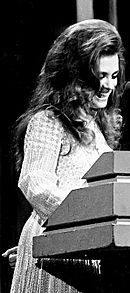
By 1968, Connie Smith was at the peak of her career, appearing in films and on TV, but she felt a lot of pressure trying to balance her career with her family life. She almost quit music. In 1968, she found comfort in Christianity, which helped her decide to continue her career. She reduced her touring schedule to spend more time with her family and on her faith. She also started appearing on more Christian music programs and worked with ministers like Billy Graham.
Connie continued to record for RCA, making sure to include gospel songs on her albums. In 1968 and 1969, RCA released albums like Sunshine and Rain and Back in Baby's Arms. Her version of Marty Robbins's "Ribbon of Darkness" became a top 20 hit in the U.S. and her first number one hit in Canada.
In the 1970s, Connie continued to have commercial success, though her songs appeared in the top 10 less often. Songs like "You and Your Sweet Love" and "I Never Once Stopped Loving You" (both by Bill Anderson) made the top 10 in 1970. Her album I Never Once Stopped Loving You also reached the top 20 on the country albums chart.
During this time, Connie also recorded two duet albums with country singer-songwriter Nat Stuckey. Their producers thought their voices would sound great together. Their first duet, "Young Love", reached the top 20. They also recorded a gospel album called Sunday Morning with Nat Stuckey and Connie Smith in 1970.
Critics praised Connie's RCA recordings from 1968 to 1972, noting the strength of her vocals. Authors Mary A. Bufwack and Robert K. Oermann said her later RCA songs are "among the most powerful country female vocal performances of the 1970s."
In the early 1970s, Connie started recording more songs written by Dallas Frazier, who became a close friend. Their song "Where Is My Castle" (1970) was about her own life. In 1971, her cover of Don Gibson's "Just One Time" reached number two on the country charts, becoming her biggest hit of the 1970s. Her album Just One Time reached number 14 on the country albums chart.
Because Connie was one of RCA's top-selling artists, she convinced them to let her record another gospel album, Come Along and Walk with Me (1971). In 1972, she had three back-to-back top hits: "Just for What I Am", "If It Ain't Love (Let's Leave It Alone)" and "Love Is the Look You're Looking For". Her album If It Ain't Love and Other Great Dallas Frazier Songs was a tribute to Dallas Frazier and reached number 14 on the country albums chart.
Changing Labels and Semi-Retirement
In 1973, Connie left RCA Records and signed with Columbia Records. Columbia promised her more control over her music, including recording one gospel album each year. She worked with producer Ray Baker, and they had a good working relationship.
At Columbia, Connie was encouraged to record songs with more pop music sounds. Her first Columbia album, A Lady Named Smith (1973), included pop elements like string instruments. Her song "Ain't Love a Good Thing" became her eighteenth top 10 hit on the Billboard country chart. She also released her first Columbia gospel album, God Is Abundant, which reached number 20 on the country albums chart.
In 1974, Columbia released her album I Never Knew (What That Song Meant Before). Its title song became a top 20 country hit. In 1975, her album I Got a Lot of Hurtin' Done Today/I've Got My Baby On My Mind featured "I've Got My Baby on My Mind" and her cover of Hank Williams's "Why Don't You Love Me", both reaching the country top 20.
In 1975, Columbia released two of her gospel albums. One was Connie Smith Sings Hank Williams Gospel, which featured gospel songs by Hank Williams that had never been recorded by another artist before. This album was nominated for a Grammy Award in 1976. The other was a Christmas album called Joy to the World. In 1976, her albums The Song We Fell in Love To and I Don't Wanna Talk It Over Anymore both reached the country albums top 40. These albums included the hit "I Don't Wanna Talk It Over Anymore" and her twentieth top 10 hit, "(Till) I Kissed You".
In 1977, Connie moved to Monument Records. She felt pressured to record even more pop-sounding country music, which she didn't like. Monument released two albums, but her only successful song was a cover of Andy Gibb's "I Just Want to Be Your Everything", which reached number 14 on the country chart. By this time, Connie had five children and felt it was important to be home with her family. She decided to leave her country music career to focus on her children and her faith.
Return to Music
For three years, Connie Smith mostly stopped performing, only occasionally appearing at the Grand Ole Opry to sing gospel songs. However, in 1983, she decided to return to her career. She signed with Epic Records with help from singer Ricky Skaggs. Her first song with Epic, "A Far Cry from You" (1985), reached number 71 on the country charts.
In the mid-1990s, Connie realized she wanted to return to music more fully. In 1996, she signed with Warner Bros. Records. Marty Stuart, a country artist whom she later married in 1997, became the main producer for her album. In October 1998, she released her album Connie Smith, which featured ten songs, nine of which she co-wrote with Marty Stuart.
Her 1998 album didn't sell a lot, but critics loved its traditional country sound. Thom Jurek of Allmusic called it "a triumphant return for Smith." In 1998, Connie also appeared in the film The Hi-Lo Country.
In August 2003, she released a gospel album called Love Never Fails with country artists Barbara Fairchild and Sharon White. This album was produced by Ricky Skaggs and was nominated for a Dove Award.
From 2008 to 2014, Connie joined the cast of The Marty Stuart Show, a TV series on RFD-TV. The show featured traditional country music performed by Marty Stuart and Connie. In August 2011, she released her first new solo album in 13 years, Long Line of Heartaches. Marty Stuart produced it, and it included five songs they wrote together. Critics praised the album, calling it "vintage traditional country."
In August 2021, Connie's album The Cry of the Heart was released. It was her first album of new songs in ten years and was also produced by Marty Stuart. The New York Times said it sounded like her classic 1960s recordings. It was her first album since 1976 to appear on a Billboard chart. PopMatters gave it a high rating, saying, "If you wanted to understand what traditional country is, you could go to the same place today as you could have 50 years ago: a Connie Smith record."
In April 2024, Connie Smith released another album, Love, Prison, Wisdom and Heartaches. It features her singing songs by her friends, sharing their music with others.
Personal Life
Connie Smith has been married four times. In 1961, she married Jerry Smith, and they had one child, Darren Justin. She later married Jack Watkins, a guitarist in her band, and they had a son. After that, she married Marshall Haynes, a telephone repairman, and they had three daughters.
After her marriage to Marshall Haynes ended, Connie said she would never marry again. However, on July 8, 1997, she married country artist Marty Stuart. Marty Stuart started producing her music after writing songs for her 1998 album. Marty first met Connie when he was 12 years old at a concert. He told his mother then that he was going to marry Connie Smith! Connie says that keeping the Lord at the center of their lives and being committed to each other has helped their marriage last.
In February 2021, Connie Smith was diagnosed with COVID-19. She was hospitalized but made a full recovery.
Musical Style and Voice
Connie Smith's music is known for its "Nashville Sound" style, especially from her early career in the 1960s. While many Nashville Sound songs used full orchestras, Connie's music kept a more traditional country feel with the use of steel guitar and her unique "twangy" voice.
Critics often praise Connie's use of the steel guitar, describing it as "sharp" and "prominent." Her steel guitar player, Weldon Myrick, is often given credit for creating what Connie calls "The Connie Smith Sound."
Connie Smith's singing voice is also a big part of her musical style. Writer Stephen Thomas Erlewine said in 2012 that Connie sings with a "cool, authoritative ease." Mary A. Bufwack and Robert K. Oermann described her singing as "a pillar-of-fire delivery sobbed with desolation." Thom Jurek of AllMusic said her vocals show "sophisticated emotional delivery" and that "her control and phrasing remain a high-water mark today."
Legacy and Honors
Many critics and historians consider Connie Smith to be one of country music's most respected artists. Thom Jurek said that Connie Smith is "perhaps the only female singer in the history of country music who can truly claim to be the heiress to Patsy Cline's throne."
Writers have also called Connie Smith an important part of country music history. Mary A. Bufwack and Robert K. Oermann called her one of country's "heroines of heartbreak" because of how much emotion she put into her singing. They also said that she and Tammy Wynette were among the "most towering country voices of the 1960s and 1970s."
Many artists in country music have said that Connie Smith was a big influence on them or that she is one of their favorite singers. George Jones said she was his favorite female singer. Elvis Presley owned many of Connie Smith's albums and wanted to record her version of "The Wonders You Perform". Dolly Parton once famously said, "You know, there's really only three female singers in the world: Barbra Streisand, Linda Ronstadt, and Connie Smith. The rest of us are only pretending."
Connie Smith has received many honors for her contributions to music. In 2002, she was ranked in the top ten on CMT's special, 40 Greatest Women of Country Music. In 2011, she was added to the West Virginia Music Hall of Fame. In 2012, Connie Smith was inducted into the Country Music Hall of Fame alongside Garth Brooks. In 2015, she celebrated 50 years as a member of the Grand Ole Opry. In 2017, Rolling Stone magazine included her on their list of the "100 Greatest Country Artists of All Time."
In March 2021, her song "Once a Day" was added to the National Recording Registry by the Library of Congress, which means it's considered an important part of American history. In April 2021, Marty Stuart announced that a documentary about Connie's life and career, called Connie: The Cry of the Heart, would be released.
Discography
Studio albums
- Connie Smith (1965)
- Cute 'n' Country (1965)
- Miss Smith Goes to Nashville (1966)
- Connie Smith Sings Great Sacred Songs (1966)
- Born to Sing (1966)
- Downtown Country (1967)
- Connie in the Country (1967)
- Connie Smith Sings Bill Anderson (1967)
- Soul of Country Music (1967)
- I Love Charley Brown (1968)
- Sunshine and Rain (1968)
- Connie's Country (1969)
- Young Love (with Nat Stuckey) (1969)
- Back in Baby's Arms (1969)
- Sunday Morning with Nat Stuckey and Connie Smith (with Nat Stuckey) (1970)
- I Never Once Stopped Loving You (1970)
- Where Is My Castle (1971)
- Just One Time (1971)
- Come Along and Walk with Me (1971)
- Ain't We Havin' Us a Good Time (1972)
- If It Ain't Love and Other Great Dallas Frazier Songs (1972)
- A Lady Named Smith (1973)
- God Is Abundant (1973)
- That's the Way Love Goes (1974)
- I Never Knew (What That Song Meant Before) (1974)
- I Got a Lot of Hurtin' Done Today/I've Got My Baby On My Mind (1975)
- Connie Smith Sings Hank Williams Gospel (1975)
- Joy to the World (1975)
- The Song We Fell in Love To (1976)
- I Don't Wanna Talk It Over Anymore (1976)
- Pure Connie Smith (1977)
- New Horizons (1978)
- The Best of Connie Smith (1989)
- By Request (1995)
- Clinging to a Saving Hand (1995)
- Connie Smith (1998)
- Love Never Fails (with Barbara Fairchild and Sharon White) (2003)
- Long Line of Heartaches (2011)
- The Cry of the Heart (2021)
- Love, Prison, Wisdom and Heartaches (2024)
Filmography
| Year | Title | Role | Notes | Ref. |
|---|---|---|---|---|
| 1966 | The Las Vegas Hillbillys | Herself | cameo | |
| Second Fiddle to a Steel Guitar | Herself | cameo | ||
| 1967 | The Road to Nashville | Herself | cameo | |
| Hell on Wheels | Herself | cameo | ||
| 1998 | The Hi-Lo Country | Singer at rodeo dance | ||
| 2008–2014 | The Marty Stuart Show | Herself | 153 episodes |
Awards and Honors
| Year | Nominee / work | Award | Result | Ref. |
|---|---|---|---|---|
| 1964 | Billboard Magazine | Most Promising Female Country Artist | Won | |
| 1965 | Grammy Awards | Best Country and Western Single – "Once a Day" | Nominated | |
| Best New Country and Western Artist | Nominated | |||
| Best Country & Western Vocal Performance, Female – "Once a Day" | Nominated | |||
| Billboard Magazine | Most Promising Female Country Artist | Won | ||
| Billboard Magazine | Favorite Female Country Performer | Nominated | ||
| Favorite Album (1964–1965) – Connie Smith | Nominated | |||
| Cash Box | Most Promising Female Country Vocalist | Won | ||
| Country Music Review | Most Promising Female Singer | Won | ||
| 1966 | Grammy Awards | Best Sacred Recording – Connie Smith Sings Great Sacred Songs | Nominated | |
| Best Country and Western Vocal Performance, Female – "Ain't Had No Lovin'" | Nominated | |||
| Billboard Magazine | Favorite Female Country Performer | Nominated | ||
| Favorite Country Album – Cute 'n' Country | Nominated | |||
| Cash Box | Most Programmed Female Artist | Won | ||
| Country Music Life Award | Favorite Female Artist | Won | ||
| Record World | Top Female Vocalist | Won | ||
| Most Outstanding Female Country and Western Vocalist | Won | |||
| 1967 | Billboard Magazine | Top Country Artist, Female Vocalist | Nominated | |
| Cash Box | Most Programmed Female Artist | Nominated | ||
| Record World | Top Female Vocalist | Nominated | ||
| Country Music Association Awards | Female Vocalist of the Year | Nominated | ||
| 1968 | Grammy Awards | Best Country & Western Solo Vocal Performance, Female – "Cincinnati, Ohio" | Nominated | |
| 1969 | Academy of Country Music | Top Female Vocalist | Nominated | |
| Grammy Awards | Best Country Vocal Performance, Female – "Ribbon of Darkness" | Nominated | ||
| 1970 | Country Music Association | Female Vocalist of the Year | Nominated | |
| Record World | Top Female Vocalist | Nominated | ||
| 1971 | Grammy Awards | Best Sacred Performance – "Whispering Hope" (with Nat Stuckey) | Nominated | |
| 1972 | Music City News Awards | Top Female Vocalist | Nominated | |
| Country Music Association | Female Vocalist of the Year | Nominated | ||
| 1974 | Grammy Awards | Best Inspirational Performance – "All the Praises" | Nominated | |
| Music City News Awards | Top Female Vocalist | Nominated | ||
| 1975 | Music City News Awards | Top Female Vocalist | Nominated | |
| 1976 | Grammy Awards | Best Gospel Performance – Connie Smith Sings Hank Williams Gospel | Nominated | |
| 1979 | Music City News Awards | Gospel Group/Act of the Year | Won | |
| 2002 | Country Music Television | 40 Greatest Women of Country Music | Won | |
| 2007 | Country Universe | 100 Greatest Women – Rank (#24) | Won | |
| 2010 | Grammy Awards | Best Country Collaboration with Vocals – "Run to You" (with Marty Stuart) | Nominated | |
| 2011 | West Virginia Music Hall of Fame | Inducted | Won | |
| 2012 | Country Music Association | Country Music Hall of Fame induction | Won | |
| 2017 | Rolling Stone | 100 Greatest Country Artists of All Time – Rank (#69) | Won |
See also
 In Spanish: Connie Smith para niños
In Spanish: Connie Smith para niños
 | Laphonza Butler |
 | Daisy Bates |
 | Elizabeth Piper Ensley |


